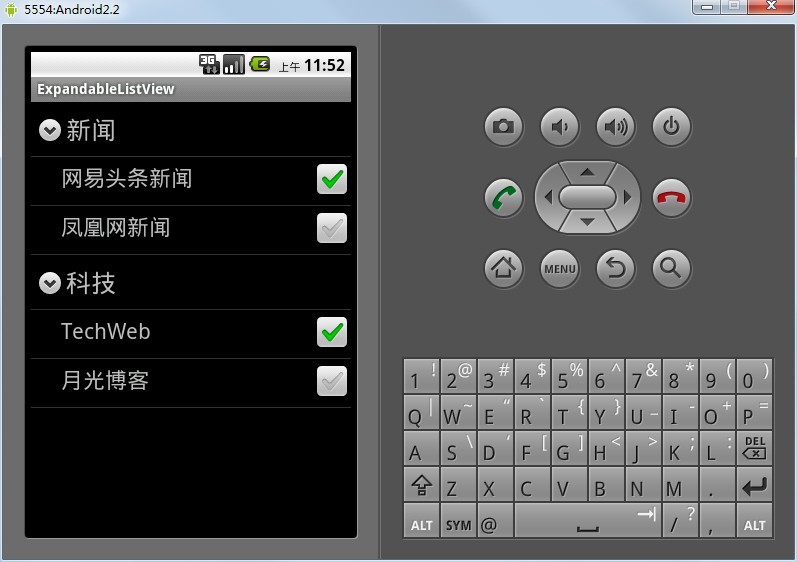针对普通的ExpandableListView的使用,即,需要显示的数据全都是使用TextView显示时,我们使用SimpleExpandableListAdapter就可以了。
但是如果是相对复杂的ExpandableListView,那么SimpleExpandableListAdapter就不满足我们的要求。
例如:在ExpandableListView中使用CheckBox控件。
这时候,我们就必须自己写一个Adapter来使用。方法是继承BaseExpandableListAdapter。

layout/main.xml
<?xml version="1.0" encoding="utf-8"?>
<LinearLayout xmlns:android="http://schemas.android.com/apk/res/android"
android:orientation="vertical"
android:layout_width="fill_parent"
android:layout_height="fill_parent">
<ExpandableListView
android:id="@id/android:list"
android:layout_width="fill_parent"
android:layout_height="fill_parent">
</ExpandableListView>
<TextView
android:layout_width="fill_parent"
android:layout_height="fill_parent"
android:id="@id/android:empty"
android:text="No Data" />
</LinearLayout>
layout/groups.xml
<?xml version="1.0" encoding="utf-8"?>
<LinearLayout xmlns:android="http://schemas.android.com/apk/res/android"
android:orientation="vertical"
android:layout_width="match_parent"
android:layout_height="match_parent">
<TextView
android:id="@+id/groupTextView"
android:layout_width="fill_parent"
android:layout_height="fill_parent"
android:textSize="25sp"
android:paddingLeft="35px"
android:paddingTop="10px"
android:paddingRight="5px"
android:paddingBottom="10px"
android:text="No Data" />
</LinearLayout>
layout/childs.xml(其实英文名字应该是children才对)
<?xml version="1.0" encoding="utf-8"?>
<RelativeLayout xmlns:android="http://schemas.android.com/apk/res/android"
android:layout_width="match_parent"
android:layout_height="match_parent">
<TextView
android:id="@+id/childTextView"
android:layout_width="wrap_content"
android:layout_height="match_parent"
android:layout_alignParentLeft="true"
android:textSize="22sp"
android:layout_marginLeft="30dip"
android:layout_marginTop="5dip"
android:text="No Data" />
<CheckBox
android:id="@+id/childCheckBox"
android:layout_width="wrap_content"
android:layout_height="match_parent"
android:layout_alignParentRight="true"
android:layout_marginLeft="50dip"/>
</RelativeLayout>
主类ExpandableListViewActivity.java
package com.zeph.android.expandablelistview.example;
import java.util.ArrayList;
import java.util.HashMap;
import java.util.List;
import java.util.Map;
import android.app.ExpandableListActivity;
import android.os.Bundle;
import android.view.View;
import android.widget.ExpandableListView;
public class ExpandableListViewActivity extends ExpandableListActivity {
@Override
public void onCreate(Bundle savedInstanceState) {
super.onCreate(savedInstanceState);
setContentView(R.layout.main);
// 创建两个一级条目标题
List<Map<String, String>> groupData = new ArrayList<Map<String, String>>();
Map<String, String> groupData1 = new HashMap<String, String>();
groupData1.put("groupTextView", "新闻");// group对应layout中的id:group
Map<String, String> groupData2 = new HashMap<String, String>();
groupData2.put("groupTextView", "科技");
groupData.add(groupData1);
groupData.add(groupData2);
// 创建第一个一级条目下的的二级条目
List<Map<String, Object>> child1 = new ArrayList<Map<String, Object>>();
Map<String, Object> childData1 = new HashMap<String, Object>();
childData1.put("childTextView", "网易头条新闻");// 同理
childData1.put("childCheckBox", 0);// 同理
Map<String, Object> childData2 = new HashMap<String, Object>();
childData2.put("childTextView", "凤凰网新闻");
childData2.put("childCheckBox", 1);
child1.add(childData1);
child1.add(childData2);
// 创建第二个一级条目下的的二级条目
List<Map<String, Object>> child2 = new ArrayList<Map<String, Object>>();
Map<String, Object> childData3 = new HashMap<String, Object>();
childData3.put("childTextView", "TechWeb");
childData3.put("childCheckBox", 0);
Map<String, Object> childData4 = new HashMap<String, Object>();
childData4.put("childTextView", "月光博客");
childData4.put("childCheckBox", 1);
child2.add(childData3);
child2.add(childData4);
// 将二级条目放在一个集合里,供显示时使用
List<List<Map<String, Object>>> childData = new ArrayList<List<Map<String, Object>>>();
childData.add(child1);
childData.add(child2);
MyExpandableListViewAdapter adapter = new MyExpandableListViewAdapter(
getApplicationContext(), groupData, R.layout.groups,
new String[] { "groupTextView" },
new int[] { R.id.groupTextView }, childData, R.layout.childs,
new String[] { "childTextView", "childCheckBox" }, new int[] {
R.id.childTextView, R.id.childCheckBox });
setListAdapter(adapter);
}
/**
* 设置哪个二级目录被默认选中
*/
@Override
public boolean setSelectedChild(int groupPosition, int childPosition,
boolean shouldExpandGroup) {
// do something
return super.setSelectedChild(groupPosition, childPosition,
shouldExpandGroup);
}
/**
* 设置哪个一级目录被默认选中
*/
@Override
public void setSelectedGroup(int groupPosition) {
// do something
super.setSelectedGroup(groupPosition);
}
/**
* 当二级条目被点击时响应
*/
@Override
public boolean onChildClick(ExpandableListView parent, View v,
int groupPosition, int childPosition, long id) {
// do something
return super.onChildClick(parent, v, groupPosition, childPosition, id);
}
}
Adapter类,MyExpandableListViewAdapter.java
package com.zeph.android.expandablelistview.example;
import java.util.List;
import java.util.Map;
import android.content.Context;
import android.view.LayoutInflater;
import android.view.View;
import android.view.ViewGroup;
import android.widget.BaseExpandableListAdapter;
import android.widget.CheckBox;
import android.widget.TextView;
/**
* 首个List对应子元素中所代表的组,第二个List对应孙子元素在子元素组中的位置. Map亦将支持这样的特殊元素。(子元素嵌套组元素的情况)
* 将XML文件中定义的静态数据映射到组及其视图的简单的适配器. 你可以用 Map的列表,为组指定其后台数据。每个数组元素对应一个可展开列表的一个组。
* Maps 包含每行的数据。你还可以指定 XML 文件来定义用于显示组的视图, 并通过 Map 的键值映射到指定的视图。该过程适用于组的子元素。
* 单级以外的可展开列表的后台数据类型为List<List<Map>>,
* 第一级列表对应可扩展视图组中的组视图,第二级列表对应组的子组视图, 最后 Map 保持子组视图的子视图的数据。
*
* @author BenZeph (以下代码和注释均参考了工具屋,网址:http://code.google.com/p/toolib/)
*/
public class MyExpandableListViewAdapter extends BaseExpandableListAdapter {
private List<? extends Map<String, ?>> mGroupData;
private int mExpandedGroupLayout;
private int mCollapsedGroupLayout;
private String[] mGroupFrom;
private int[] mGroupTo;
private List<? extends List<? extends Map<String, ?>>> mChildData;
private int mChildLayout;
private int mLastChildLayout;
private String[] mChildFrom;
private int[] mChildTo;
private LayoutInflater mInflater;
/**
* 调用另外一个构造函数,其中From和To的含义和不同的ListView相同,
* 可以参考ListView或者SimpleExpandableListViewAdapter
*
* @param context
* @param groupData
* @param groupLayout
* @param groupFrom
* @param groupTo
* @param childData
* @param childLayout
* @param childFrom
* @param childTo
*/
public MyExpandableListViewAdapter(Context context,
List<? extends Map<String, ?>> groupData, int groupLayout,
String[] groupFrom, int[] groupTo,
List<? extends List<? extends Map<String, ?>>> childData,
int childLayout, String[] childFrom, int[] childTo) {
this(context, groupData, groupLayout, groupLayout, groupFrom, groupTo,
childData, childLayout, childLayout, childFrom, childTo);
}
/**
*
* @param context
* @param groupData
* @param expandedGroupLayout
* @param collapsedGroupLayout
* @param groupFrom
* @param groupTo
* @param childData
* @param childLayout
* @param lastChildLayout
* @param childFrom
* @param childTo
*/
public MyExpandableListViewAdapter(Context context,
List<? extends Map<String, ?>> groupData, int expandedGroupLayout,
int collapsedGroupLayout, String[] groupFrom, int[] groupTo,
List<? extends List<? extends Map<String, ?>>> childData,
int childLayout, int lastChildLayout, String[] childFrom,
int[] childTo) {
mGroupData = groupData;
mExpandedGroupLayout = expandedGroupLayout;
mCollapsedGroupLayout = collapsedGroupLayout;
mGroupFrom = groupFrom;
mGroupTo = groupTo;
mChildData = childData;
mChildLayout = childLayout;
mLastChildLayout = lastChildLayout;
mChildFrom = childFrom;
mChildTo = childTo;
mInflater = (LayoutInflater) context
.getSystemService(Context.LAYOUT_INFLATER_SERVICE);
}
@Override
public Object getChild(int groupPosition, int childPosition) {
// 取得与指定分组、指定子项目关联的数据。
return mChildData.get(groupPosition).get(childPosition);
}
@Override
public long getChildId(int groupPosition, int childPosition) {
// 取得给定分组中给定子视图的ID。 该组ID必须在组中是唯一的。组合的ID (参见getCombinedGroupId(long))
// 必须不同于其他所有ID(分组及子项目的ID)。
return childPosition;
}
@Override
public View getChildView(int groupPosition, int childPosition,
boolean isLastChild, View convertView, ViewGroup parent) {
// 取得显示给定分组给定子位置的数据用的视图。
View v;
if (convertView == null) {
v = newChildView(isLastChild, parent);
} else {
v = convertView;
}
bindChildView(v, mChildData.get(groupPosition).get(childPosition),
mChildFrom, mChildTo);
return v;
}
@Override
public int getChildrenCount(int groupPosition) {
// 取得指定分组的子元素数。
return mChildData.get(groupPosition).size();
}
@Override
public Object getGroup(int groupPosition) {
// 取得与给定分组关联的数据。
return mGroupData.get(groupPosition);
}
@Override
public int getGroupCount() {
// 取得分组数
return mChildData.size();
}
@Override
public long getGroupId(int groupPosition) {
// 取得指定分组的ID。该组ID必须在组中是唯一的。组合的ID (参见getCombinedGroupId(long))
// 必须不同于其他所有ID(分组及子项目的ID)。
return groupPosition;
}
@Override
public View getGroupView(int groupPosition, boolean isExpanded,
View convertView, ViewGroup parent) {
// 取得用于显示给定分组的视图。 这个方法仅返回分组的视图对象, 要想获取子元素的视图对象,
// 就需要调用 getChildView(int, int, boolean, View, ViewGroup)。
View v;
if (convertView == null) {
v = newGroupView(isExpanded, parent);
} else {
v = convertView;
}
bindGroupView(v, mGroupData.get(groupPosition), mGroupFrom, mGroupTo);
return v;
}
@Override
public boolean hasStableIds() {
// 是否指定分组视图及其子视图的ID对应的后台数据改变也会保持该ID。
return true;
}
@Override
public boolean isChildSelectable(int groupPosition, int childPosition) {
// 指定位置的子视图是否可选择。
return true;
}
/**
* 创建新的组视图
*
* @param isExpanded
* @param parent
* @return
*/
public View newGroupView(boolean isExpanded, ViewGroup parent) {
return mInflater.inflate((isExpanded) ? mExpandedGroupLayout
: mCollapsedGroupLayout, parent, false);
}
/**
* 创建新的子视图
*
* @param isLastChild
* @param parent
* @return
*/
public View newChildView(boolean isLastChild, ViewGroup parent) {
return mInflater.inflate((isLastChild) ? mLastChildLayout
: mChildLayout, parent, false);
}
/**
* 绑定组数据
*
* @param view
* @param data
* @param from
* @param to
*/
private void bindGroupView(View view, Map<String, ?> data, String[] from,
int[] to) {
// 绑定组视图的数据,针对Group的Layout都是TextView的情况
int len = to.length;
for (int i = 0; i < len; i++) {
TextView v = (TextView) view.findViewById(to[i]);
if (v != null) {
v.setText((String) data.get(from[i]));
}
}
}
/**
* 绑定子数据
*
* @param view
* @param data
* @param from
* @param to
*/
private void bindChildView(View view, Map<String, ?> data, String[] from,
int[] to) {
TextView v = (TextView) view.findViewById(to[0]);
if (v != null) {
v.setText((String) data.get(from[0]));
}
CheckBox c = (CheckBox) view.findViewById(to[1]);
if (c != null) {
if (data.get(from[1]).equals(0)) {
c.setChecked(true);
} else {
c.setChecked(false);
}
}
}
}
程序本身还存在问题,checkbox在点击修改了状态之后,缩小组,在展开组,checkbox的状态会还原。
这是因为,在点击展开时,会重新调用getChildView函数,于是子列表的中的数据重新初始化了。所以数据就还原了。
因此,这个位置的代码还需要修改。才能满足要求。





















 501
501










